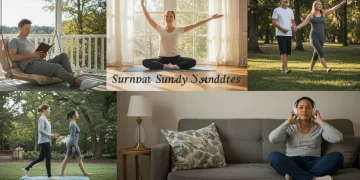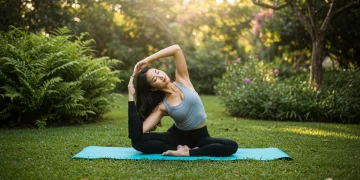Self-Care Sundays: Gentle Yoga for Relaxation & Flexibility
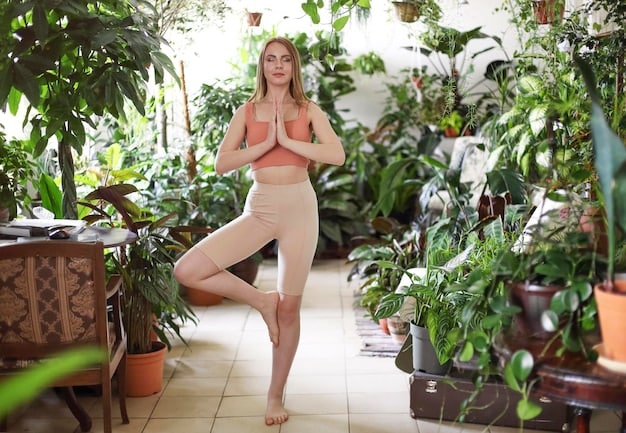
Advertisements
Self-Care Sundays offer a perfect opportunity to unwind and rejuvenate, and incorporating gentle yoga can significantly enhance flexibility and reduce stress, creating a balanced and peaceful start to your week.
With the hustle of daily life constantly pulling us in different directions, carving out specific time for self-care is essential. Self-Care Sundays: Discover the Benefits of Gentle Yoga for Flexibility and Stress Reduction can be a transformative practice, offering a sanctuary of peace and rejuvenation.
Advertisements
What is Gentle Yoga?
Gentle yoga is a modified approach to traditional yoga that focuses on slow, deliberate movements and deep breathing. This style is designed to be accessible to everyone, regardless of age, fitness level, or prior experience with yoga.
Unlike more vigorous forms of yoga, gentle yoga emphasizes relaxation and stress reduction, making it an ideal practice for Self-Care Sundays. It provides a soothing way to connect with your body and mind.
Key Principles of Gentle Yoga
Gentle yoga incorporates several key principles that differentiate it from other types of yoga. These principles contribute to its therapeutic and restorative benefits, making it perfect for a relaxing Self-Care Sunday.
- Mindful Movement: Paying close attention to each movement, ensuring it is slow and controlled.
- Deep Breathing: Coordinating breath with movement to enhance relaxation and reduce tension.
- Modifications: Adjusting poses to accommodate individual needs and limitations.
- Relaxation: Incorporating restorative poses and techniques to promote deep relaxation and stress relief.
Gentle yoga goes beyond mere exercise; it’s a holistic practice that integrates physical postures, breathwork, and mindfulness to create a state of deep relaxation and inner peace. It is a perfect complement to a Self-Care Sunday routine, helping to reduce stress and improve overall well-being.
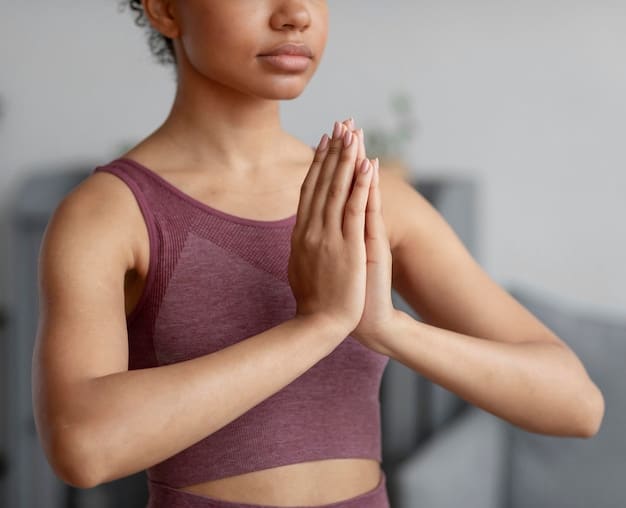
Benefits of Gentle Yoga for Flexibility
One of the primary benefits of incorporating gentle yoga into your Self-Care Sunday routine is improved flexibility. Gentle yoga stretches and lengthens muscles, increasing range of motion and reducing stiffness.
Regular practice can lead to enhanced physical comfort and ease of movement in your daily life. The focus on slow, deliberate movements allows muscles to gently release tension, gradually increasing flexibility over time.
Improving Range of Motion
Gentle yoga poses are designed to target major muscle groups, promoting flexibility throughout the body. These poses help to increase the range of motion in joints, making everyday activities easier and more comfortable.
- Cat-Cow Pose: Enhances spinal flexibility and promotes gentle stretching of the back and abdomen.
- Seated Forward Fold: Lengthens the hamstrings and lower back, improving flexibility in these areas.
- Gentle Twists: Increase mobility in the spine and release tension in the torso.
- Child’s Pose: Gently stretches the hips, thighs, and ankles, promoting relaxation and flexibility.
Consistent practice of these poses can have a profound impact on your overall flexibility, making you feel more agile and limber. A flexible body is also less prone to injury, making gentle yoga a valuable practice for long-term physical health.
Stress Reduction Through Gentle Yoga
Beyond physical flexibility, gentle yoga is highly effective at reducing stress and promoting relaxation. The combination of mindful movement and deep breathing techniques helps to calm the nervous system and quiet the mind.
This makes it an ideal practice for Self-Care Sundays, allowing you to start your week feeling centered and at peace. The focus on the present moment reduces anxiety and promotes a sense of calm.
Calming the Nervous System
Gentle yoga activates the parasympathetic nervous system, which is responsible for the body’s relaxation response. This helps to counteract the effects of chronic stress and anxiety.
Through specific poses and breathing techniques, gentle yoga can effectively lower levels of cortisol, the body’s primary stress hormone, which can contribute to stress reduction and overall well-being.
- Deep Breathing Exercises: Slow, deep breaths stimulate the vagus nerve, promoting relaxation.
- Progressive Muscle Relaxation: Consciously tensing and releasing different muscle groups to release tension.
- Body Scan Meditation: Focusing attention on different parts of the body to identify and release areas of tension.
By incorporating these practices into your Self-Care Sunday routine, you can effectively manage stress and cultivate a sense of inner peace. Gentle yoga offers a therapeutic way to restore balance and harmony to your mind and body, creating a solid foundation for the week ahead.
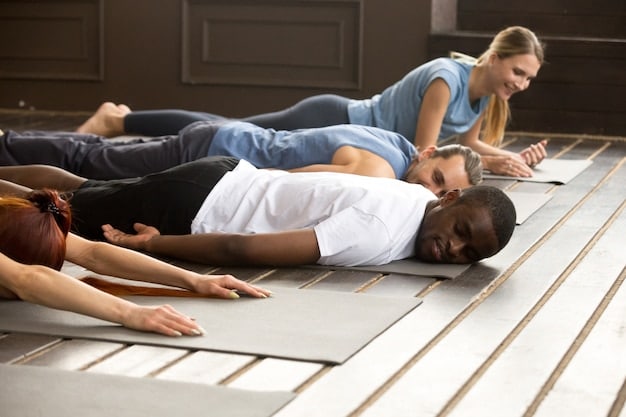
Gentle Yoga Poses for Beginners
If you’re new to yoga, starting with gentle poses is a great way to ease into the practice. These poses are accessible to all fitness levels and can be easily modified to suit your individual needs. Gentle yoga poses can be easily incorporated into your Self-Care Sunday routine.
Remember to listen to your body and never push yourself beyond your comfort zone. Yoga is about honoring your body and finding what feels good for you.
Essential Poses to Start With
These poses are a perfect starting point for anyone looking to incorporate gentle yoga into their Self-Care Sunday routine.
- Mountain Pose (Tadasana): Establishes a foundation of stability and grounding, improving posture and body awareness.
- Child’s Pose (Balasana): Gently stretches the hips, thighs, and ankles while calming the mind.
- Cat-Cow Pose (Marjaryasana to Bitilasana): Enhances spinal flexibility and promotes gentle stretching of the back and abdomen.
- Corpse Pose (Savasana): Allows for complete relaxation and integration of the practice, promoting deep rest and rejuvenation.
Remember to breathe deeply and focus on the sensations in your body as you move through each pose. With regular practice, you’ll find that these poses become more comfortable and accessible, gradually increasing your flexibility and reducing stress.
Creating Your Self-Care Sunday Yoga Routine
Designing your own Self-Care Sunday yoga routine can be a fun and rewarding experience. Take the time to explore different poses and find what feels best for your body and mind. Remember, the goal is to create a practice that nourishes you and supports your well-being.
Consider the time frame you want to dedicate to our gentle yoga practice and make sure it fits within your Sunday schedule. Even 15-20 minutes of gentle yoga can be beneficial.
Tips for a Fulfilling Routine
Here are some practical tips for setting up a Self-Care Sunday yoga routine.
- Set the Mood: Create a calming environment with soft lighting, soothing music, and comfortable surroundings.
- Warm-Up: Begin with gentle stretches and movements to prepare your body for the practice.
- Incorporate Variety: Include a mix of standing, seated, and lying poses to target different muscle groups.
- Cool-Down: End with restorative poses and deep relaxation to promote a sense of calm and integration.
By following these tips, you can create a Self-Care Sunday yoga routine that nourishes your body, calms your mind, and sets you up for a successful week ahead. Embrace the opportunity to connect with yourself on a deeper level and prioritize your well-being.
Maintaining Consistency and Progress
Consistency is key when it comes to experiencing the full benefits of gentle yoga. Making it a regular part of your Self-Care Sunday routine will yield greater results over time. Prioritizing your well-being contributes to lasting stress reduction and overall flexibility.
Find ways to stay motivated and committed to your practice and be a part of our Self-Care Sundays.
Staying Motivated
There are several strategies you can use to maintain consistency and progress with your gentle yoga practice.
- Schedule It: Block out time on your calendar for your Self-Care Sunday yoga routine, treating it as a non-negotiable appointment with yourself.
- Find a Buddy: Practice with a friend or family member to provide mutual support and accountability.
- Track Your Progress: Keep a journal or use an app to track your progress and celebrate your achievements.
By incorporating these strategies into your Self-Care Sunday routine, you can maintain consistency and continue to reap the benefits of gentle yoga for years to come. Remember to be patient with yourself and celebrate even the smallest victories along the way.
| Key Aspects | Brief Description |
|---|---|
| 🧘♀️ Gentle Yoga | Modified yoga for relaxation and flexibility. |
| 😌 Stress Reduction | Calms nervous system, lowers cortisol levels. |
| 💪 Flexibility | Increases range of motion and reduces stiffness. |
| 🗓️ Consistency | Schedule yoga regularly for lasting benefits. |
Frequently Asked Questions
▼
Gentle yoga is a modified form of traditional yoga which primarily focuses on slow, deliberate movements and deep breathing, creating a safe and accessible practice for all fitness levels.
▼
Gentle yoga reduces stress by activating the parasympathetic nervous system, promoting relaxation, and reducing cortisol levels. Deep breathing and mindful movements contribute to a sense of calm.
▼
Some basic gentle yoga poses for beginners include Mountain Pose, Child’s Pose, Cat-Cow Pose and Corpse Pose. These poses gently stretch the body and promote relaxation.
▼
For best results, incorporate gentle yoga into your Self-Care Sunday routine at least once a week. Consistency helps deepen the benefits of relaxation and better flexibility over time.
▼
Yes, modifications of gentle yoga poses should be made to accommodate individual needs and limitations. Listen to your body and adjust the intensity as necessary to ensure comfort and safety.
Conclusion
Incorporating Self-Care Sundays: Discover the Benefits of Gentle Yoga for Flexibility and Stress Reduction is a wonderful way to prioritize your well-being and start your week feeling refreshed and balanced. With its focus on gentle movements, deep breathing, and mindfulness, gentle yoga offers a myriad of benefits for both your body and mind, making it a valuable addition to your self-care routine.
